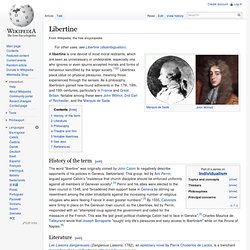

Orgy. In modern usage, an is a sex party where guests freely engage in open and unrestrained sexual activity or group sex . Swingers ' parties do not always conform to this designation due to the fact that at many swinger parties the sexual partners may all know each other or at least have some commonality among economic class, educational attainment or other shared attributes. Some swingers contend that an orgy, as opposed to a sex party , requires some anonymity of sexual partners in complete sexual abandon. [ 1 ] Other kinds of " sex party " may fare less well with this labelling.
Participation in an "orgy" is a common sexual fantasy and group sex targeting such consumers is a subgenre in pornographic films . The term is also used metaphorically in expressions, such as an "orgy of colour" or an "orgy of destruction" to indicate excess, overabundance. The term " orgiastic " does not generally connote group sex and is closer to the classical roots and this metaphorical usage. [ edit ] Ancient. Group sex. Illustration from the Kama Sutra Group sex is sexual behavior involving more than two participants.

Group sex can occur amongst people of all sexual orientations and genders. Group sex also occurs in non-human animals such as bonobo apes and chimpanzees. Fantasies of group sex are extremely common among both men and women, and group sex is a subgenre in pornographic films. Terms[edit] In principle, any sexual behaviour performed by more than two people can be referred to as group sex, but various terms are used to describe particular acts or combinations of people.
Group masturbation among men, usually sitting in somewhat of a circle formation. Gang bang A number of people performing sex acts on one person, either in turn or at the same time. Threesome or three-way Three people all having sexual relations, not necessarily simultaneously. Sex between four people. Double penetration When a person is entered or penetrated in the vagina and/or anus by two people at the same time. Spintrian. Sex club. Sex clubs also known as swinger clubs or lifestyle clubs, are formal or informal groups that organize sex-related activities or establishments where patrons can engage in sex acts with other patrons.

A sex club or swinger club differs from a brothel in that, while sex club patrons typically pay an annual membership and nightly entrance fee, they only have an opportunity to have consensual sex with other willing patrons, and not with sex workers employed by the establishment. Genres[edit] A similar type of club is a masturbation club in which members, either single-gender or mixed, masturbate together in public or private rooms. Sexual intercourse is generally prohibited in such clubs. There is also a very large and growing group of private sex clubs that do not operate in a specified location. Many sex clubs have some form of online presence.
Marquis de Sade. Life[edit] Early life and education[edit] The Marquis de Sade was born in the Hôtel de Condé, Paris, to Jean Baptiste François Joseph, Count de Sade and Marie Eléonore de Maillé de Carman, cousin and Lady-in-waiting to the Princess of Condé.

He was educated by an uncle, the Abbé de Sade. Later, he attended a Jesuit lycée, then pursued a military career, becoming Colonel of a Dragoon regiment, and fighting in the Seven Years' War. In 1763, on returning from war, he courted a rich magistrate's daughter, but her father rejected his suitorship and, instead, arranged a marriage with his elder daughter, Renée-Pélagie de Montreuil; that marriage produced two sons and a daughter.[1] In 1766, he had a private theatre built in his castle, the Château de Lacoste, in Provence. Sade's father, Jean-Baptiste François Joseph de Sade. Title and heirs[edit] The men of the Sade family alternated between using the marquis and comte (count) titles. Libertine. A libertine is one devoid of most moral restraints, which are seen as unnecessary or undesirable, especially one who ignores or even spurns accepted morals and forms of behaviour sanctified by the larger society.[1][2] Libertines place value on physical pleasures, meaning those experienced through the senses.

As a philosophy, libertinism gained new-found adherents in the 17th, 18th, and 19th centuries, particularly in France and Great Britain. Notable among these were John Wilmot, 2nd Earl of Rochester, and the Marquis de Sade. History of the term[edit] The word "libertine" was originally coined by John Calvin to negatively describe opponents of his policies in Geneva, Switzerland. Literature[edit] Les Liaisons dangereuses (Dangerous Liaisons, 1782), an epistolary novel by Pierre Choderlos de Laclos, is a trenchant description of sexual libertinism.
The libertine novel was an 18th century literary genre of which the roots lay in the European but mainly French libertine tradition. Musée de l'érotisme de Paris - Museum of eroticism of Paris.